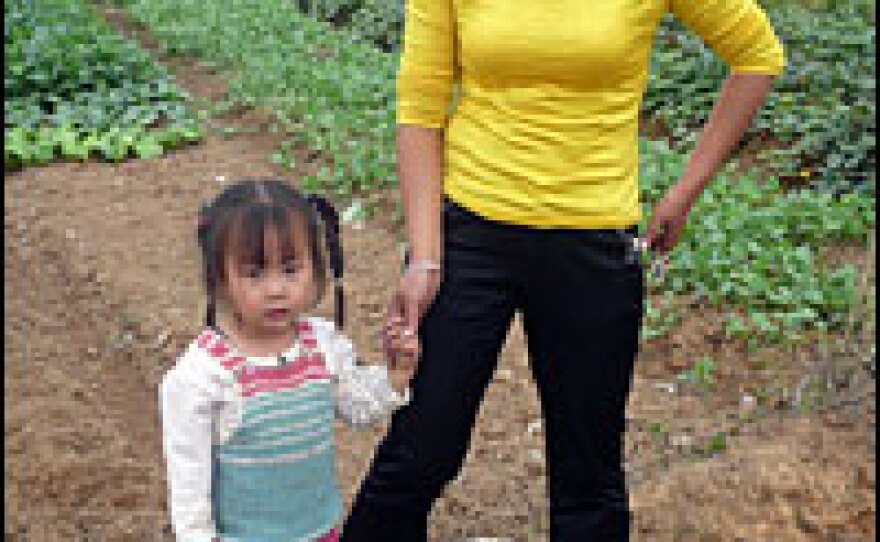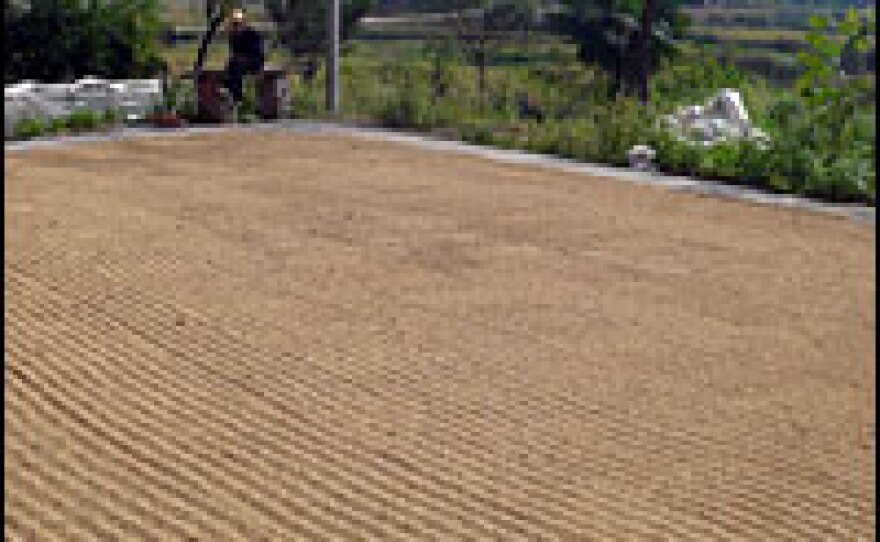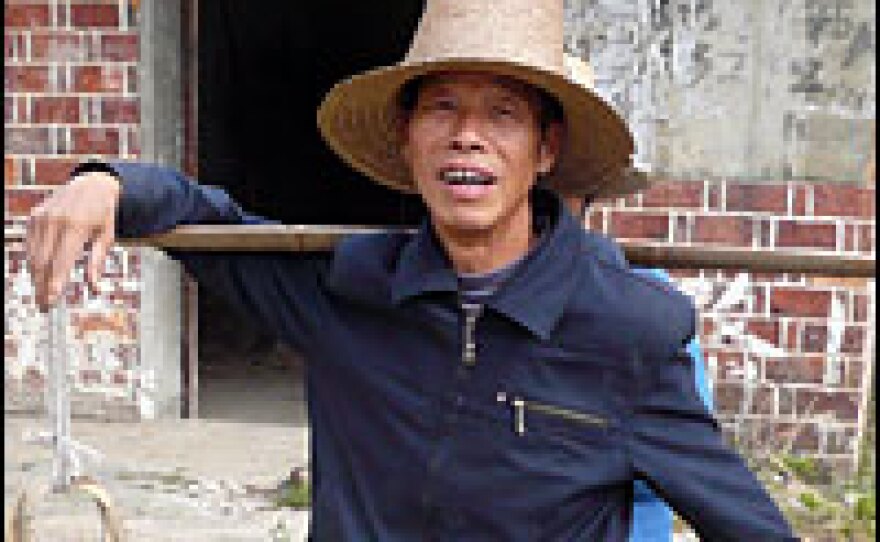

In China, land issues and peasant rebellions have traditionally brought down imperial dynasties. Land reform was at the heart of the Communist Revolution in 1949.
Now China's leaders have quietly announced a new rural revolution, making it easier for farmers to lease or trade their land-use rights. This will transform life for the country's 700 million farmers. But these changes are not being welcomed by everyone.
Moving Toward Cooperatives
It's planting season in Beiping village in Hunan province, and Zhang Shilin is planting youmaicai, a green vegetable, on his plot. It's a strip of land shaped like a noodle — two paces wide by almost 30 paces long.
In his village, each farmer's plot of land averages less than one-fifth of an acre, making farming extremely inefficient. That's one reason the Chinese government has announced reforms.
"If we each tend our own plots by ourselves, we'll never get rich," Zhang says. "We need to lease our land out to professionals to increase our incomes."
The frail 64-year-old hauls up buckets of water to irrigate the tiny plot. With the young gone to the cities to make money, farming here is done by the elderly. But that won't be the case for much longer.
Under the new reforms, Beiping village is the first in the province to set up a cooperative. It will lease farmers' land, consolidate the patchwork of plots, then modernize and mechanize farming.
In return, it promises each farmer 440 pounds of grain a year or the cash equivalent at market prices. After three years, each will also receive a share of the cooperative's profits. They won't have to do anything for it, unless they want to work for the collective, earning about $8 a day.
Chinese farmers don't actually own their land, but they do have land-use rights — and these reforms make it easier for farmers to lease these rights or sell them to agribusiness. Any land transferred can only be used for farming, in order to guarantee China's food security.
"It wasn't difficult to decide to sign the form," says Huang Qing, 24, who left the village six years ago but is back for a vacation. This policy is designed to spur urbanization, by allowing peasants to migrate to the cities without worrying about the land or returning for harvest season.
"It's tough for the old people left behind to do the farming," Huang says. "This is a better way."
Resistance From The Elderly
However, there's resistance among the village's senior citizens. Land has traditionally served as social security for China's peasants, and some fear these reforms could potentially create millions of landless farmers.
"There's no money without land," says Liu Jiude, 76. "The changes are bad for us older people."
An elderly man wearing thick spectacles, Liu is perched on a low stool in his front yard, sifting out hulks of soybeans. The older villagers are also grappling with the ideological implications too; some fear a return to the days of exploitative landlords, whose evils were the subject of communist propaganda. Nowadays, it seems big landlords are fine, so long as they raise incomes.
Village Communist Party Secretary Liu Fuyuan dismisses ideological concerns.
"Our leaders are rolling out policies to help farmers get rich," Liu says. "They want to close the gap between the city and the countryside. They want to urbanize the countryside. The small fields will become big fields, and we'll have rows and rows of houses like in the city."
Jettisoning Communist Ideology
As he juggles phone calls, Liu looks stressed. He is also head of the collective and village chief. That's a big concentration of power in one person. He is charged with pushing through these reforms in Beiping. He says 80 percent of the village's 2,018 residents have signed over their land — those who don't want to can opt out.
"Of course there's a lot of pressure," Liu says. "We're out in front. We're an experimental place, so we're allowed to succeed or fail by ourselves."
Thus, China's Communist Party is jettisoning ideology for the sake of economic necessity. Rural dwellers earn just one-third of what the urbanites do and, given the rising discontent, the focus is on increasing countryside incomes.
"We shouldn't expect miracles in the short run," says Louis Kuijs, the World Bank's economist in Beijing. "This is one of the key processes that is necessary to rebalance China's economy in the sense of bringing more growth to the countryside, therefore allowing and stimulating the migration of farmers to the cities, so that the large income gap between rural and urban areas can be closed down."
But China's leaders have steered clear of more radical reform; farmers still can't use their land to get loans, and they don't have ownership rights over their land. Nonetheless, these reforms are politically sensitive — and that becomes abundantly clear at Beiping village.
While speaking to villagers, a local official who refuses to identify himself arrives. "We can't tell you any details," he says. "It's too early. We're still working it out."
Details aside, these reforms are far-reaching — China's Communist leaders rose to power by liberating peasant farmers from the reviled landlord class; now they're promising to liberate peasants from the land itself.
Copyright 2022 NPR. To see more, visit https://www.npr.org. 9(MDAzMjM2NDYzMDEyMzc1Njk5NjAxNzY3OQ001))







